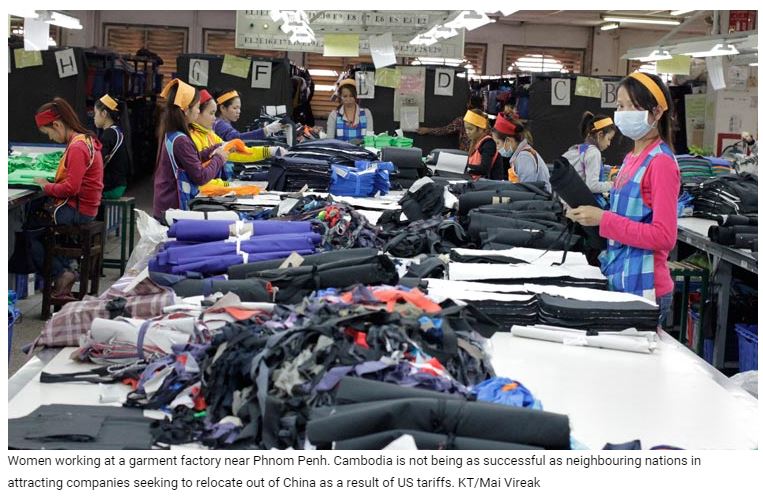Companies planning relocation to Southeast Asia to avoid US tariffs
Sixteen companies are seeking to alternate production bases from China to Southeast Asia to circumvent US import tariffs resulting from the US-China trade dispute, the Nikkei Asian Review recently reported.
For in depth analysis of Cambodian Business, visit Capital Cambodia
Vietnam, Thailand, and Indonesia will absorb the bulk of the new production. 11 of the 16 companies interviewed by Nikkei Asian Review said they are planning to start manufacturing in Vietnam or Thailand.
Cambodia was not included in the list of countries they are considering for the shift.
The main businesses of these companies are metals, machine tools, home electronics, personal computers, home appliances, electric devices, lighting equipment, personal computers, textile, furniture, and chemicals.
Although Vietnam and Thailand are emerging as the preferred destinations, these two South Asia nations still face capacity constraints, including red tape and limited skilled labor and infrastructure, Nikkei Asian Review said.
On Friday, Lim Heng, vice president of the Cambodia Chamber of Commerce, lamented that Cambodia was not being considered by these companies to relocate.
Mr Heng was speaking at a seminar in Phnom Penh that brought together economists, analysts, researchers, and officials to discuss the US-China trade dispute and how it affects Cambodia.
He told Khmer Times that compared to neighbouring Vietnam, Cambodia lacks infrastructure and skilled labour, and added that these are weaknesses that must be urgently addressed.
“Cambodia must prioritise investments in road infrastructure, electricity, and its labour force,” he said.
Mr Heng said Cambodia’s failure to attract companies wishing to relocate out of China must be chalked up to Vietnam and Thailand’s superior capacity and infrastructure.
Business Insider reported in November that US-based bicycle maker Kent International Inc is shifting production from China to Cambodia, while American shoe giant Steve Madden and Baowu Group, China’s leading steelmaker, are also planning to increase production in the country.
Pen Sovicheat, deputy secretary general at the Ministry of Commerce, told Khmer Times on Friday that relocated businesses have mostly gravitated toward Vietnam due to its geographical proximity and cheap labour.
He also acknowledged that Cambodia’s problems with the power supply and low productivity make it a less attractive destination, but added that the government is working relentlessly to fix the country’s power woes and attract FDI.
“Investors are seeking cheap skilled labour and a favourable geographical location that allows them to turn high profits,” he said.
Dr. Ki Sereyvuth, an economics professor and a researcher at the Royal Academy of Cambodia, echoed Mr Sovicheat’s comments, arguing that Cambodia’s productivity remains limited.
When asked whether companies that have relocated to Cambodia would move back to China, Mr Sereyvuth said this was unlikely.
“Once they move to our country, they will stay because they don’t want to give up their high profits,” he said, adding that they would only consider moving if the political situation in the country becomes unstable and threatens business growth.
Shipments of goods from China to the US via Vietnam, Taiwan and Mexico have seen a notable increase from January to March this year, particularly in machinery and parts, electrical equipment and parts, furniture, toys, and automobiles and parts, Asian Nikkei Review reported.
During the three-month period, exports of the five items from China to Vietnam rose by $1.5 billion, or 20 percent, while exports from Vietnam to the US surged by $2.7 billion, or 58 percent.
Exports of the five items from China to Taiwan increased by $1.4 billion, or 23 percent, while such exports from Taiwan to the US expanded by $2 billion, or 31 percent.
Exports from China to the US via Mexico also increased. Mexico’s exports to the US surpassed those of China to become the biggest source in March.
The trade conflict between China and the United States escalated last month when US President Donald Trump raised tariffs on hundreds of billions of Chinese imports to 25 percent and threatened levies on all Chinese goods.
During last week’s G20 leaders’ summit in Osaka, Japan, US President Donald Trump and China’s president Xi Jinping held a bilateral meeting and agreed to resume trade negotiations.
President Trump said the meeting with Mr Xi was far better than expected.
“I agree not to increase the already existed tariffs that we charge China, while we continue to negotiate,” Mr Trump tweeted on Sunday, adding that there will be no reduction in the tariffs currently being charged to the country.
Source: https://www.khmertimeskh.com/50619458/companies-planning-relocation-to-southeast-asia-to-avoid-us-tariffs/


 Thailand
Thailand




